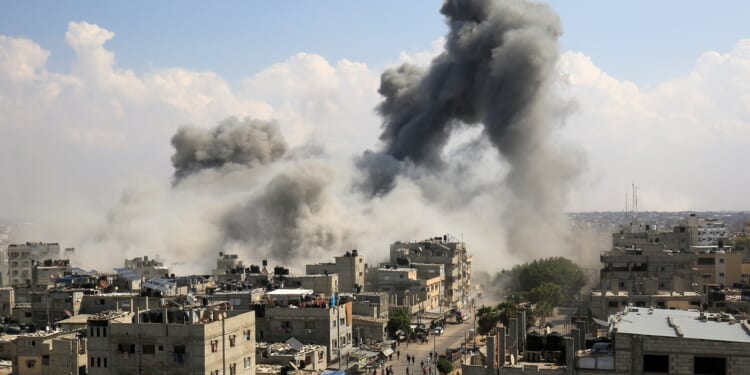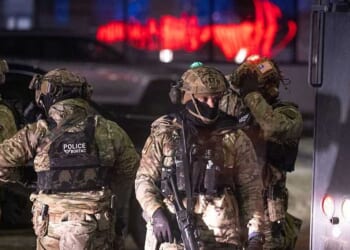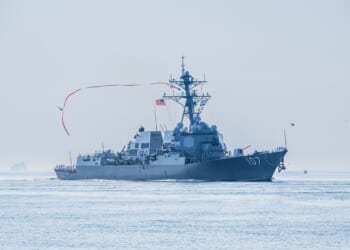For decades, America’s role in the Gulf rested as much on trust as on power—the belief that hosting US forces guaranteed protection of sovereignty. That belief has now been shaken.
Israel’s strike on Hamas leaders in Doha came as a strategic shock to Hamas, to the United States, and to the Arab world. For Hamas, it may have eliminated senior figures who had taken refuge outside Gaza. For Qatar—a US Major Non-NATO Ally and the host of America’s Al Udeid Air Base, the largest Air Force installation in the Middle East and the forward headquarters of the US Central Command—it marked an unprecedented breach of sovereignty. And for Washington, it struck at the credibility of the security order it has long built in the Gulf.
America’s preeminent position in the Gulf rests on a simple bargain: Arab partners host US forces in exchange for deterrence against external threats and protection of sovereignty. That bargain now looks increasingly fragile. If Arab states conclude that Washington cannot or will not shield them from violations of sovereignty, US security guarantees decline in value, lessening America’s influence and opening the door for other partnerships. Russia and China are already positioned to exploit the gap, offering arms, energy, and diplomatic cover while presenting themselves as more respectful of Arab sovereignty. At the same time, regional powers may accelerate their drive for defense autonomy, with Turkey casting itself as both supplier and enabler. The strike in Doha, in other words, has implications far larger than its immediate target: it calls into question not just one alliance, but the very foundation of US dominance in the Gulf.
Israel’s Strike on Doha Showed the Limits of US Influence
Even as Qatar anchors the US military presence in the Gulf, trust in Washington’s willingness to defend its sovereignty had already begun to fray. Since 2003, Al Udeid has served as CENTCOM’s forward hub for America’s wars in Iraq, Afghanistan, and Syria, housing over 10,000 personnel and projecting power across the Gulf, Levant, and South Asia. For Washington, Qatar offers a launchpad at the region’s crossroads. For Doha, on the other hand, the base has long functioned as a shield deterring rivals from direct confrontation. The base’s presence in Qatar proved invaluable during the 2017-2021 Gulf diplomatic crisis, in which three of Qatar’s neighbors severed relations and imposed trade embargoes—but stopped short of direct military intervention, in part due to concerns about how the US would respond.
But America’s shield is cracking. After Iranian missiles landed near Al Udeid months ago, a senior Qatari official asked one of us (Sara) whether the United States would have defended civilian areas if Iran had targeted them instead of the base—a question that exposed doubts about whether US forces would protect Qatar itself, or only American assets.
The Israeli strike transformed those private doubts into a regional crisis of confidence. It showed that even with a massive US base on its soil, Qatar was not insulated from attack. For Doha and its neighbors, it was less an operational lapse than a strategic betrayal, proving that Washington could not deter violations of sovereignty even by its closest partner. The Arab League and the Organization of Islamic Cooperation convened a joint emergency session, issuing a rare unanimous condemnation. From Riyadh to Amman to Ankara, leaders branded the attack a “brutal aggression,” a “cowardly act,” and a violation of international law. Egypt broke its mediator’s neutrality, while Jordan declared, “Qatar’s security is Jordan’s security.” The breadth of the backlash was striking: The UAE, Israel’s normalization partner, closed ranks with Egypt, Jordan, and Turkey, underscoring that the strike had become a collective Arab and Islamic grievance rather than Qatar’s alone.
This fury reflected more than the breach itself. Since the October 7, 2023 terrorist attacks that launched the Gaza war, America has been steadfast in defending Israeli security interests. The Israeli strike on Doha, however, showed that Washington was unwilling or unable to extend the same assurances to Arab allies. For many leaders, what stung most was the silence from Washington in the attacks’ aftermath, reinforcing the perception that the US would not protect Arab sovereignty. Trust, not firepower, is the true currency of security alliances; bases, arms sales, and exercises matter only if partners believe their sovereignty will be defended. Once that trust erodes, even the most formidable military architecture begins to lose coherence. The strike in Doha has pushed that erosion into the open.
America’s Adversaries Are Making Inroads in the Gulf
The fraying of trust in Washington’s security umbrella has created an opening that Russia and China have long prepared to exploit. Both powers have expanded their Gulf presence, offering arms, technology, and diplomatic cover without the political constraints that bind the United States. The Israeli strike in Qatar sharpened their intended message: the United States cannot protect you, but we can.
Moscow moved quickly to reinforce that narrative. In a call with Qatari Prime Minister and Foreign Minister Mohammed bin Abdulrahman Al Thani, Russian Foreign Minister Sergey Lavrov denounced the Israeli strike as a “flagrant violation of international law and an unacceptable assault on the sovereignty and territorial integrity of friendly Qatar.” This show of solidarity rested on steadily deepening ties. Since 2017, Doha and Moscow have signed defense-technical cooperation agreements, discussed S-400 sales, concluded arms deals, and even sent Qatari soldiers to Russian military academies. Energy and investment are equally important. As founding members of the Doha-based Gas Exporting Countries Forum (GECF), the two share institutional leverage in global gas policy. The Qatar Investment Authority’s 19 percent stake in Rosneft and a €2 billion joint fund launched in 2025 cemented those links. Moscow’s outreach after the strike thus built on years of engagement rather than mere momentary opportunism.
Across the Gulf, Russia has sought to project itself as a dependable partner, expanding arms sales and leveraging energy diplomacy. Its longtime intervention in Syria once signaled a readiness to defend allies, an image Arab leaders contrasted with Washington’s hesitancy. Of course, Moscow’s unwillingness to save Syrian dictator Bashar Al Assad in late 2024 revealed the limits of that commitment. Still, its coordination with Saudi Arabia through OPEC+ has entrenched Russia as a central player in global energy markets. The United Arab Emirates has also deepened its ties with Moscow, maintaining neutrality on the Ukraine war and emerging as a hub for Russian trade, capital, and investment. Non-oil trade between the two countries reached $11.5 billion in 2024 and is projected to double within five years, while coordination through OPEC+. New agreements such as the 2025 Trade in Services and Investment Agreement have further anchored the partnership. For Gulf states wary of overdependence on Washington, Moscow provides not only hardware, but also insurance against the United States.
If Russia has leaned on diplomacy, arms, and energy, Beijing’s entry point has been technology and trade. China already has a foothold in Qatar: Doha fields the SY-400 ballistic missile system, relies on Huawei to build its 5G telecommunications network, and has locked in two record 27-year gas supply deals. Bilateral trade continues to grow, with China exporting machinery and electronics while importing Qatari energy. This blend of defense hardware, digital infrastructure, and energy finance gives Beijing a durable platform should Doha seek to diversify beyond Washington.
China’s reach in the Gulf is broader than Qatar alone. It is now the region’s largest trading partner, a leading supplier of drones where US exports are restricted, and a central investor in Belt and Road infrastructure. Chinese unmanned aerial systems are deployed from North Africa to the Arabian Peninsula, and Beijing has even conducted joint defense exercises with Cairo. The United Arab Emirates has also deepened its comprehensive strategic partnership with Beijing, marking 40 years of diplomatic ties in 2024 with record bilateral trade of $101.8 billion and ambitious plans to double that figure by 2030. Cooperation now spans Belt and Road projects at Khalifa Port, financial market links, AI and digital infrastructure, and even joint military exercises, underscoring the UAE’s role as a key hub for China’s regional ambitions. Most symbolically, China brokered the 2023 normalization between Iran and Saudi Arabia, projecting itself as a diplomatic power capable of shaping regional outcomes once dominated by Washington. Yet unlike Russia, Beijing has so far avoided military entanglements, preferring economic and diplomatic leverage over direct security commitments.
Against this backdrop, the strike in Doha could accelerate Gulf diversification. If Qatar were to deepen partnerships with Moscow or Beijing, the ripple effects would be felt across the region. Such a pivot would signal to Arab states that US protection is no longer indispensable, weakening not just bilateral ties but the very architecture of American dominance in the Gulf. What was once unthinkable, the loss of Washington’s monopoly as security guarantor, is now a plausible scenario, with Russia and China already waiting in the wings.
Gulf States Want Flexibility—and Reliable Partners
Even before the strike in Qatar, Gulf states were moving toward greater independence in defense production. Saudi Arabia’s Vision 2030 set the goal of localizing half of its defense spending by 2030; localization has already risen from 4 percent in 2018 to nearly 20 percent in 2024. The United Arab Emirates has consolidated its arms sector under EDGE Group, now one of the fastest-growing military manufacturers in the world, exporting drones and precision munitions to Africa and Asia. Egypt has leveraged its longstanding production base to expand arms exports and training partnerships. Together, these efforts reflect a shared ambition to limit dependence on external patrons, particularly the United States, for critical military capabilities.
Qatar, though smaller, has also begun laying the foundations of its own defense industry. Barzan Holdings, launched in 2018, serves as the hub for procurement, research, and joint ventures. It has partnered with firms from Turkey, Italy, France, and the United States on drones and armored vehicles, while investing heavily in R&D and technology transfer. Events such as the DIMDEX defense exhibition have showcased Qatar’s intent to be not only a buyer but also a producer. The Israeli strike could accelerate this trajectory, turning what was once a long-term aspiration into a pressing necessity.
Turkey is uniquely positioned to enable this shift. President Erdogan has cultivated his defense industry as both a tool of foreign policy and a source of national prestige. Turkish drones, particularly the Bayraktar TB2, have proved effective from Libya to Nagorno-Karabakh and Ukraine, attracting Arab buyers. In 2024, Turkish defense exports reached a record $7.1 billion. At the Doha summit, Erdogan offered partnership, declaring his industry “ready to share capabilities and experiences” to help Arab states build their own capacity. His message was clear: Turkey can be both supplier and enabler, providing weapons and the know-how to produce them at home.
If outrage at the strike translates into action, Turkey could become the bridge between frustration and autonomy, accelerating the indigenous industries Gulf states have long sought. In that scenario, waning trust in US protection would not only weaken Washington’s role as security guarantor but also empower Arab states to reshape the regional balance of power on their own terms—with Turkey as a central partner.
In short, the Israeli strike in Qatar will be remembered less for its impact on Hamas than for the questions it raised about US credibility. For decades, America’s role in the Gulf rested as much on trust as on power—the belief that hosting US forces guaranteed protection of sovereignty. Though that belief has not been dispelled altogether, it has been shaken. For Arab partners, the issue is no longer whether to hedge against US security guarantees, but how quickly to do so. That unraveling of confidence may prove to be the strike’s most consequential legacy—not merely for Hamas or Israel, but for the future of the regional order.
The reverberations of this realignment extend far beyond the Gulf. Great power competition is no longer confined to the Indo-Pacific or Eastern Europe; it is already playing out in the Middle East, where Russia and China are steadily carving out space once monopolized by Washington. If Arab states conclude that US guarantees are conditional, they will hedge toward Moscow, Beijing, or by fast-tracking their own defense industries, often with Turkey’s help.
In the Middle East, as everywhere, national interests drive national policy. If allies come to believe their sovereignty is negotiable, they will adjust accordingly. And America’s credibility could unravel far faster than any military advantage can repair.
About the Authors: Sara Harmouch and Abdullah Hayek
Sara Harmouch is CEO of H9 Defense, a national security consultancy and government contractor specializing in geopolitical risk and OSINT. A defense policy expert and counterterrorism researcher, she focuses on Islamist militant groups, irregular warfare, alliance dynamics, and state–nonstate interactions. Raised in Lebanon and fluent in Arabic and French, she has conducted fieldwork across MENA and Europe and briefed OSD, NATO, the State Department, and the Office of Net Assessment. She consults for the U.S. government and the private sector, and her work has appeared in War on the Rocks, Lawfare, The Conversation, Defense One, Long War Journal, NPR, VOA, DW News, and elsewhere. She holds a Ph.D. from American University. Follow her on Twitter / X: @Dr_SaraHarmouch.
Abdullah Hayek is an advanced track writer and commentator and a Middle East History & Peace Fellow with Young Voices. He also serves as an independent Middle East analyst and consultant based in Washington, DC. He previously specialized in the political, economic, and military affairs of the Levant, Iraq, and Arabian Gulf regions at The Washington Institute for Near East Policy. Follow him on Twitter / X: @ahayek99.
Image: Shutterstock / Anas-Mohammed.

















